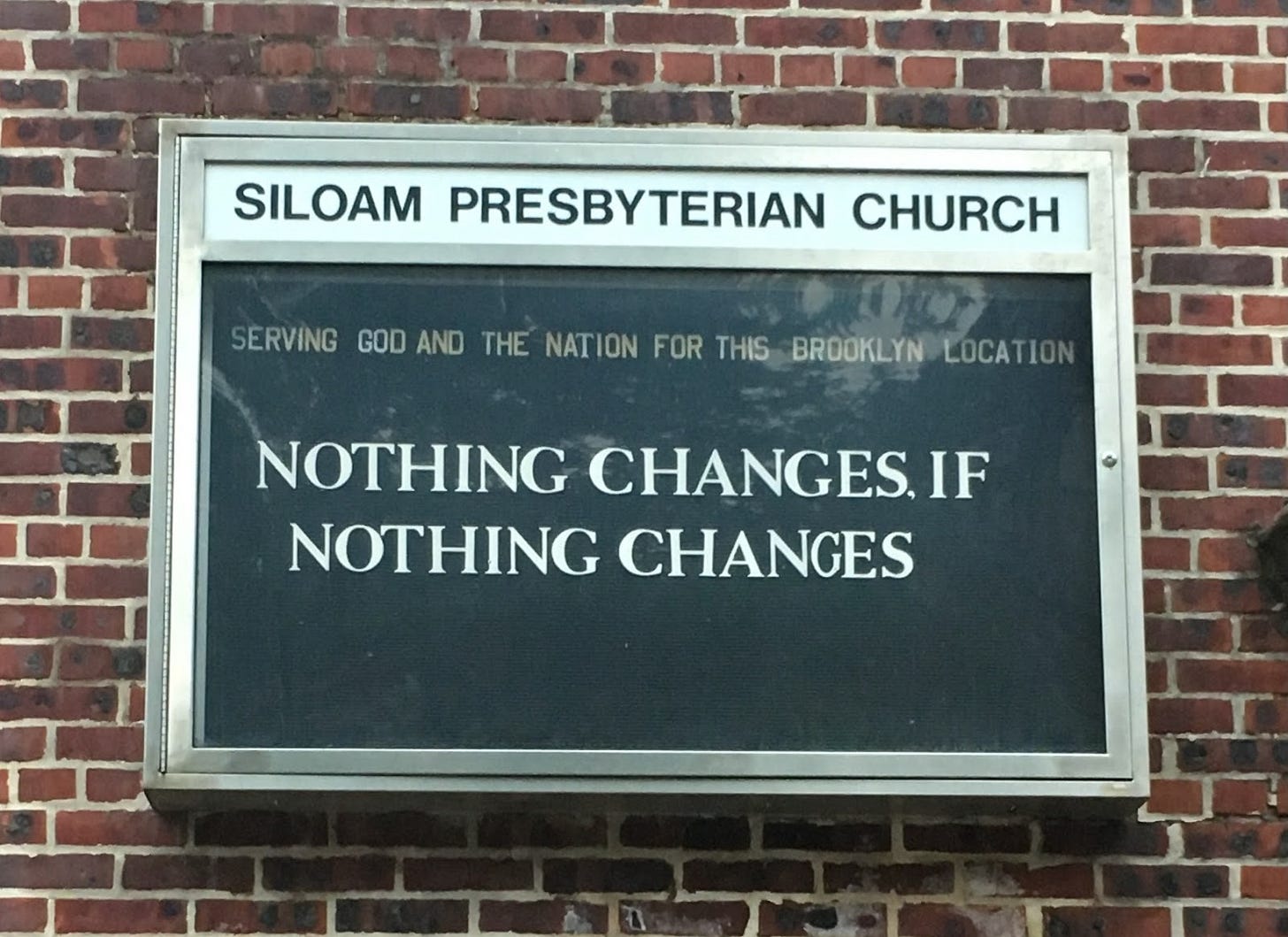How to be the change you want to see in your world
Plus some personal updates, including a doggo photo!
Hello and welcome to Academia Made Easier. I am so glad that you are here.
One of the Substack writers I enjoy following is Anne Helen Petersen, author of “Culture Study.” Her most recent post about her personal experiences with academia demonstrates many of the challenges of graduate education. Some excerpts:
On accepting a grad school offer: “[I] was accepted by several programs — none of them with funding, but I thought paying for your MA was just part of what you did. … I didn’t understand that accepting people like me was necessary for the program to fund its PhD program and, after that first year, staff its undergraduate writing courses.”
On her time as a graduate student: “I mistook the necessary machinations of the system for praise and affirmation that I was succeeding and would continue to do so. I thought getting peer-reviewed papers accepted early and often meant my work was good when it actually meant there were more journals, some of dubious prestige, demanding more content. I thought getting into a “top” PhD program would be an assured job but they were just filling a quota.”
On her post-PhD career prospects: “I had no marketable skills; I had a long CV but no resume. … Grad school and the skills you acquire there theoretically expand your marketability and job prospects, but in the humanities, it narrows them.”
On her reluctance to leave academic precarity: “The institution thrives on our fear of failure, on the mortification of “sunk cost,” and by sucking up our available time and resources in ways that make it impossible to cultivate other skills or quadrants of life. We stay, despite so many signs we should leave, because we have allowed the work to paper over the doors.”
Petersen’s story resonated with me because it is so familiar. I have been engaged in research and service to create change in graduate education since 2016 and have spoken to countless graduate students and faculty members frustrated with the status quo.
Dissatisfaction with the status quo — be it with graduate education or any other aspect of your world — is an important catalyst for action. When you are dissatisfied with the status quo, you have the opportunity to channel your dissatisfaction to create the change you want to see in the world. Today’s small thing to try immediately is about how to do this while managing your ‘regular’ academic work.
One Small Thing to Try Immediately: Chip away at a problem that matters to you
Changing the world, even a small aspect of it, is often long, slow, and unrelated to one’s ‘real’ academic work. If you decide to take it on, here are some suggestions based on my experience:
1. Calibrate your aspirations to your career stage. The desire to create change has an urgency about it. This urgency can be tricky for people in positions of employment precarity (including pre-tenure academic positions). There are only so many hours in a day and change work is often invisible, time-consuming, and entirely divorced from the metrics necessary to move one out of employment precarity. Kerry Ann Rockquemore argues that academics need a clear mental model for combining scholarship and activism. One model she includes – and this is the one I chose – is waiting to achieve tenure and promotion before working to advance to change. Give careful thought to what level of engagement is manageable at your current career stage and allow yourself to wait if that is most appropriate.
2. Pick your battle (singular) – and then narrow it down. You are one person, with many other demands on your time and energy. Chances are good that the change work you do will on top of your regular responsibilities, so you need to be focused. You can’t engage with all of the changes you see that need attention, and it is not your responsibility to do so. If you aspire to be impactful, limit yourself to one area. And because change takes time, select something you can imagine sticking to exclusively for years. Once you have picked your change area, put strong scope limits in place. In my case, rather than considering all graduate education, I focus on the social sciences and humanities. Rather than considering multiple postsecondary systems, I focus on Canada. Trying to create change in this narrower field is enough.
3. Allow your engagement to build over time. Start small. Work with others. Keep chipping away, watch for opportunities, and let things to accumulate. My path started with conversations. Complaining about the system with a colleague in my discipline led to cohosting some student workshops, which led to a book for graduate students, which led to invitations to conduct external program reviews that hopefully will lead to program changes at those universities. A discussion with a colleague in my institution led to a university-wide study of graduate training that is resulting in changes within my university. A pilot study led to a research grant that led to journal articles, which led to a book for faculty members and others in the position to make changes on behalf of graduate students at universities across Canada. In my experience, small efforts consistently applied can grow into momentum. Keep chipping away and allow the work to build.
4. Anticipate the tyranny of the status quo and decide to move forward anyway. In a recent article in the Chronicle of Higher Education, James Shulman laments his unsuccessful efforts to create change in the area of American college sports. He writes, “nothing about athletics changed because of our book. We failed utterly in our effort to provoke institutional change. In doing so, we joined in a great 100-year parade — throngs of faculty, administrators, grant-makers, policymakers, students, and families who have banged their heads on the wall of change in higher education. Athletics may represent a particularly change-resistant corner of higher education, but almost any kind of change in academe seems difficult, if not impossible.” As someone who has just published a book encouraging change in academe, this is a discouraging paragraph. But the reality is that institutions and cultures – inside and outside the academy – are change-resistant. Know this at the outset and decide if you still want to do the work. If you do, determine what small victories will be rewarding and allow them to be enough. For me, I find satisfaction in thinking through the arguments, in working with like-minded colleagues, and in conversations with individuals and departments open to change and possibility. Change is slow. It is up to you to determine what will make you happy along the way.
Photo I took during a 2019 trip to New York City. While I am not a church person, the message resonates with me.
Chipping Away: What I Have Been Up To
A quick update on some of my activities since my last newsletter, since I have your attention:
I am humbled and delighted to report that I am a recipient of a 3M National Teaching Fellowship, Canada’s highest post-secondary teaching award. I am truly honoured by this award – and even had the pleasure of speaking about it on a local radio program.
In my last newsletter, I discussed my three-part series on emotional labour in academia with my good friend Christie Schultz. Part two is now out! Please check out “The skills of care: navigating emotional labour in academia” if you are interested in strategies to manage the emotional labour in your work.
I had the pleasure of appearing on the Your Words Unleashed podcast to discuss essential tips for making academia easier. Thank you to Leslie Wang for inviting me to this conversation. If you are a podcast lover, please listen to our discussion!
As I mentioned in April, making sure one’s work reaches its target audience is an important part of knowledge mobilization. To this end, my co-authors and I are working to increase awareness of our new book, including a book launch (thanks again to the University of Alberta!), an article in The Conversation (“Arts graduate education in Canada should be redesigned around students’ and society’s needs”), and a new Substack, “Reimagining Graduate Education” (please sign up and join the discussion!).
Until next time…
As always, I encourage you to take time to enjoy your non-work life. I am a firm believer that academic success is built on a foundation of personal well-being. Your work matters and your personal well-being matters. In my corner of the world, it is spring, which means tulips and flowering trees and more runs with my beloved running buddy Sammie. So much joy. I wish you the same.
Stay well, my colleagues.
P.S. I mentioned Sammie, which clearly demands a picture. Here is Sammie (on the right) and her best buddy, Hank. Too. Cute. For. Words. I feel so lucky to have dog buddies as neighbours as our cats would NOT stand for them in our own family.
Photo credit to my neighbour/Hank’s dad!
If you find Academia Made Easier useful, please consider supporting my chocolate habit through my Buy me a coffee page. This site allows readers to show their appreciation for the unpaid labour of writers like me, as well as artists and other creatives. 🍫🧁🙏
If you like the look of classically styled women’s clothing and the feel and functionality of athleisure, I strongly recommend SophieGrace, a Canadian company. Be sure to use my discount code AcademiaMadeEasier to get 20% off.




OMG I am so happy for your 3M award! Hurrah hurrah hurrah!
Thank you for sharing this post and these guidelines for ways to disrupt the toxic parts of academia!